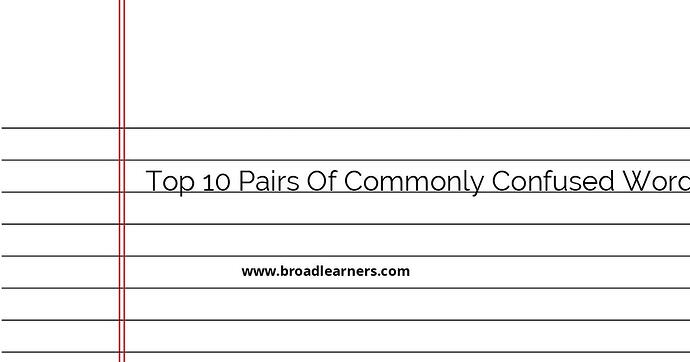English language learners often stumble upon words that are pronounced similarly or have similar spellings but carry different meanings. This can lead to confusion and misuse in writing or spoken communication. Below, we explore the top 10 pairs of commonly confused words and provide detailed explanations and examples to clarify their correct usage:
- Affect vs. Effect
- Compliment vs. Complement
- Principal vs. Principle
- Emigrate vs. Immigrate
- Stationary vs. Stationery
- Its vs. It's
- Accept vs. Except
- Desert vs. Dessert
- Advice vs. Advise
- Than vs. Then
Now let's delve into each pair in more detail:
1. Affect vs. Effect
- Affect (verb)
- Means to influence or make a change to something.
- Effect (noun)
- Refers to the result or outcome of a change.
Example: The new policy will affect the entire company.
Example: The medication had a positive effect on her health.
2. Compliment vs. Complement
- Compliment (noun/verb)
- Means an expression of praise or admiration.
- Complement (noun/verb)
- Refers to something that completes or enhances something else.
Example: She received a compliment on her presentation skills.
Example: The red wine complements the steak perfectly.
3. Principal vs. Principle
- Principal (noun/adjective)
- Refers to the head of a school or an important figure, or the main amount of money.
- Principle (noun)
- Means a fundamental truth or rule.
Example: The principal announced a new policy at the school assembly.
Example: He refused to compromise on his principles.
4. Emigrate vs. Immigrate
- Emigrate (verb)
- Means to leave one's own country to settle in another.
- Immigrate (verb)
- Means to come to a new country to live permanently.
Example: She decided to emigrate from Ireland to Canada.
Example: They immigrated to the United States in 1994.
5. Stationary vs. Stationery
- Stationary (adjective)
- Means not moving or staying still.
- Stationery (noun)
- Refers to writing materials like paper, pens, and envelopes.
Example: The car remained stationary in the parking lot.
Example: She bought new stationery for her office.
6. Its vs. It's
- Its (possessive pronoun)
- Indicates ownership or belonging.
- It's (contraction)
- Short for 'it is' or 'it has'.
Example: The dog wagged its tail happily.
Example: It's going to rain today.
7. Accept vs. Except
- Accept (verb)
- Means to agree to receive or acknowledge something.
- Except (preposition/conjunction)
- Means excluding or otherwise than.
Example: She accepted the invitation to the gala.
Example: Everyone agreed with the plan except John.
8. Desert vs. Dessert
- Desert (noun/verb)
- Refers to a barren area with little precipitation, or to abandon.
- Dessert (noun)
- A sweet course typically served at the end of a meal.
Example: The desert is hot and dry during the day.
Example: Don't desert your friends in times of need.
Example: She served chocolate cake as dessert.
9. Advice vs. Advise
- Advice (noun)
- Refers to guidance or recommendations offered.
- Advise (verb)
- Means to offer suggestions or guidance.
Example: I need your advice on which car to buy.
Example: She advised me to take the scenic route.
10. Than vs. Then
- Than (conjunction)
- Used to introduce a comparison.
- Then (adverb)
- Used to denote time, indicating 'at that time' or 'next'.
Example: She is taller than her brother.
Example: We will eat dinner, and then we'll see a movie.
Understanding these differences can significantly enhance your communication skills and prevent common errors. Use these examples as a reference to choose the right word when you're faced with these commonly confused pairs.
Did I miss anything? Respond below
